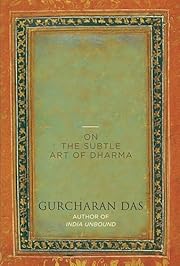

Klicka på en bild för att gå till Google Book Search.
|
Laddar... The difficulty of being good : on the subtle art of dharma (utgåvan 2009)av Gurcharan Das
VerksinformationThe Difficulty of Being Good: On the Subtle Art of Dharma av Gurcharan Das
 Ingen/inga Det finns inga diskussioner på LibraryThing om den här boken.  Very insightful book. Was delighted after reading the book. The book portrays the concept of the difficulty of being a good person taking Mahabharat as an apt example and brought about a concise picture of often confused concept of DHARMA. For me the question still remains as to why be (completely) good ?? I am a bit disappointed in this book, not on the subject matter or how it is rendered but rather by the methods used by the Author to present his findings. The first thing I noticed is the undertone of elitism a la Raja Ram Mohan Roy. A feeling that western evidence trumps what is available at home. While talking about the Gita, he prefers to quote western authors who I would say are mediocre at best. They would like you to believe their version of the Truth rather than the truth (which they probably will never be able to attain). While a surfeit of superior evidence and collateral are available at home penned by the authorities in their respective domains, his choice seems rather strange. The other thing is to conduct this study in Chicago, where this work of translation is being conducted with a purely scientific bent (I am doing it because I am being paid for it and it is after all a job and I will look cool doing all this eastern philosophical stuff). So after a lifetime of peddling diapers and toothpaste for a western corporation, these choices do not seem that strange. The Bibliographic references towards the end are really nice. I am a bit disappointed in this book, not on the subject matter or how it is rendered but rather by the methods used by the Author to present his findings. The first thing I noticed is the undertone of elitism a la Raja Ram Mohan Roy. A feeling that western evidence trumps what is available at home. While talking about the Gita, he prefers to quote western authors who I would say are mediocre at best. They would like you to believe their version of the Truth rather than the truth (which they probably will never be able to attain). While a surfeit of superior evidence and collateral are available at home penned by the authorities in their respective domains, his choice seems rather strange. The other thing is to conduct this study in Chicago, where this work of translation is being conducted with a purely scientific bent (I am doing it because I am being paid for it and it is after all a job and I will look cool doing all this eastern philosophical stuff). So after a lifetime of peddling diapers and toothpaste for a western corporation, these choices do not seem that strange. The Bibliographic references towards the end are really nice. This book looks at the main characters of the Mahabharata, and plumbs the moral depths of an old HIndu society where answers were no clear cut. The struggle as to what to do is at the heart of the Mahabharata, and this book, to which I did not give proper justice, takes on a journey with the main characters of the epic and their struggles. Their are major chapters devoted to Duryodhana, Draupadi, Yudhishthira, Arjuna, Bhishma, Karna, Krishna, and Ashwatthama. The closely-related families of the Pandavas and Kauravas create a war that may not settle anything, but has enthralled listeners and readers for centuries. At some point I would like to have this book as a reference in my library. inga recensioner | lägg till en recension
Gurcharan Das turns to the Mahabharata in order to answer the question, why be good?, and discovers that the epic's world of moral haziness and uncertainty is closer to our experience as ordinary human beings than the narrow and rigid positions that define most debate in this fundamentalist age of moral certainty. Inga biblioteksbeskrivningar kunde hittas. |
Pågående diskussionerIngen/ingaPopulära omslag
 Google Books — Laddar... Google Books — Laddar...GenrerMelvil Decimal System (DDC)294.5923Religions Other Religions Religions of Indic origin Hinduism Hindu scriptures Sacred Scriptures MahabharataKlassifikation enligt LCBetygMedelbetyg: (4) (4)
Är det här du? |
||||||||||||||||||||||||||||||||||||||||||||||||||||||||||||||||||||||||||||||||||||||||||||||||||||||||||||||||||||||||||||||||||||||